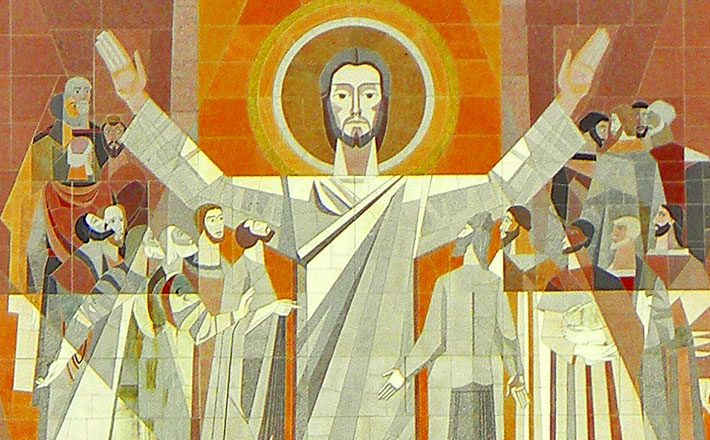Commentary on John 17:6-19
This week’s text is the middle of Jesus’ prayer for his friends, which brings to a close the extended farewell section of this Gospel (John 13-17).
The lectionary assigns the opening and closing of the prayer to other years of the cycle. This midsection of the prayer begins with a progress report in John 17:6-8, developing the introductory statement of John 17:2-4 about Jesus’ mission in the world. And then it moves into the intercessory prayer of John 17:9-26, with this week’s text ending with John 17:19.
As in John 15:1, where the branches are tended by God, so here God is at work before Jesus begins, and Jesus asks for that work to continue once he is no longer physically present.
The verb give occurs 17 times in this chapter, more by far than in any other chapter of the New Testament. The uses of this verb tell the story of the prayer in nuce: The Father gives Jesus authority over all flesh to give eternal life to all whom God has given him. He has given Jesus work to do, but most of all in the section under consideration this week, it is a question of those whom God has given Jesus from the world. They were first the Father’s own but are now Jesus’ own. Jesus has given them words and indeed the word (logos) that the Father gave to him. But the prayer is about them, the given ones.
The rootedness of Jesus and “his own” (as they are called in John 13:1) in the Father, their given-ness, dominates the prayer. That they have been drawn into the love of Father and Son and into the mission of God in the world is Jesus’ doing, but it is first God’s doing. That this should be so underscores the theological emphasis in a Gospel where we tend to be especially aware of the Christological.
Jesus makes three requests on their behalf in this week’s section of the prayer. The first two are variations on a single request for protection. In John 17:11, Jesus asks that the Holy Father should protect the ones whom he has given Jesus in his (the Father’s) name so that they may be one as the Father and Son are one. The point of the protection is that they should mirror and be drawn into the oneness in love of the Father and Son themselves, as is made even clearer in John 17:21-23, which is not part of this text but is essential for understanding it. They are to be protected so that they may love as they have been commanded to love in a way that not only draws them into union with the divine love but also shows that love to the world into which they are being sent as Jesus has been sent; the previous sending of Jesus and current sending of Jesus’ own is another important theme in the prayer. So Jesus’ own are to be protected not only for their own sakes but also in order to fulfill the mission of love in the world.
The second petition is that the Father should protect them from the evil one (John 17:15), whose activity has been highlighted with respect to Judas (John 13:2, 27), the one Jesus has lost because he was destined to be lost (John 17:12).
Emerging from that second request is the third, that they be sanctified in the truth (John 17:17), further defined as the Father’s word (logos), both of which we know, from John 1:1-18 (logos) and John 14:6 (truth), to be the Son Jesus himself. The word for sanctified is translated hallowed in the Lord’s Prayer; the Father’s name there is to be sanctified, and here Jesus’ own themselves, God’s gift to him, are to be hallowed for God’s purposes. This is bound up with their being sent into the world as earlier, in John 10:36, the Son’s sending has been linked with his sanctification. Jesus’ own are set apart for the logos, God’s self-revealing testimony, God’s act of love in the world.
The emphasis on the world underscores the importance of God’s mission of love. The world, which appears 13 times in these 14 verses, is complicated in John. One could easily be forgiven for seeing it as mostly scary and hate-full; certainly if we don’t notice those things about the world in John, it is because we are not reading the whole of the Gospel but are reading the happy parts and skipping over the difficult ones. However, to read the world as only that is to dismiss the Gospel’s most famous verse (John 3:16!) along with some others or to suggest that the world God loves is something other than the one spoken of as broken and hate-full, and that is surely to underestimate God and God’s love and to misread the whole thrust of this narrative.
If the broken world isn’t the one that is so beloved, then the lifting up of the Son makes no sense. Jesus need not die if he is only in the world for the sake of the people who like him. And Jesus’ own will not be in danger if they are to bear fruit in happy isolation. The reason that they are mirroring the union of the Father and Son and carrying the love of God and Jesus for them into the world that doesn’t know God is precisely that God loves that world and wants it to know that love.
In the center of the prayer (John 17:13) is Jesus’ intention that in hearing the prayer spoken “in the world” where they are being sent even as Jesus is returning to the Father, his own should find his joy made complete in themselves. We saw already in last week’s text Jesus’ intention that his words should issue in joy for his own (see that lectionary commentary for a paragraph on Johannine joy). There it was that they should have joy in his command to them to abide in love; now they are to find joy in overhearing Jesus’ prayer on their behalf for the same thing — that they should be protected for love by the one in whose love they dwell.


May 17, 2015